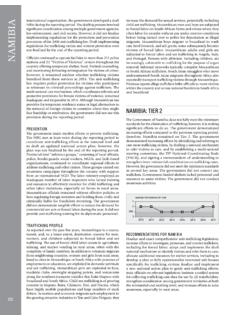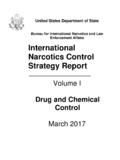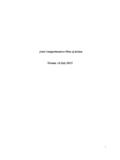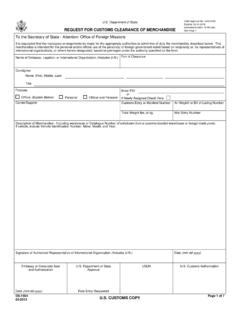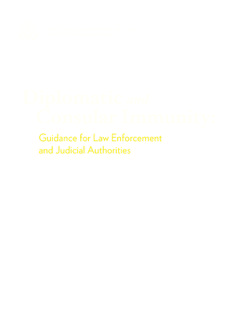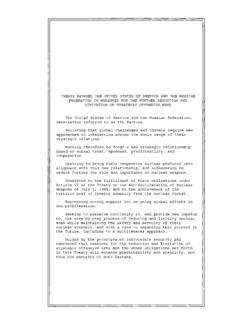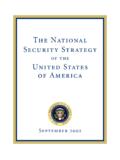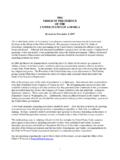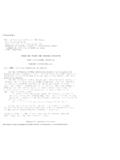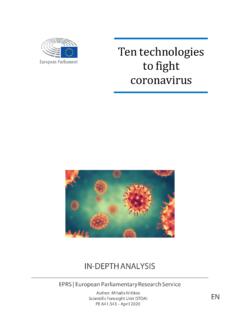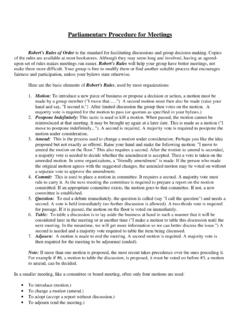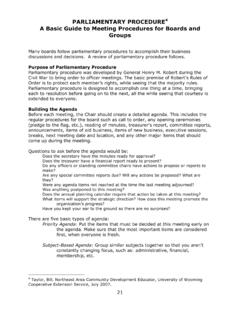Transcription of VENEZUELA 2020 HUMAN RIGHTS REPORT - U.S. …
1 VENEZUELA 2020 HUMAN RIGHTS REPORT EXECUTIVE SUMMARY While VENEZUELA is legally a multiparty, constitutional republic, the illegitimate authoritarian regime led by Nicolas Maduro usurped control over the executive, judicial, citizens power (which includes the prosecutor general and ombudsman), and electoral branches of government, and stood up a parallel, illegitimate legislative body alongside the existing elected one. On January 10, 2019, Maduro s constitutional term as president ended, but he refused to cede control based on his claimed victory in the 2018 presidential elections, which were widely condemned as neither free nor fair. On January 23, 2019, Juan Guaido, as president of the National Assembly, assumed the role of interim president pursuant to the provisions of the constitution related to vacancies. Maduro, with the backing of Cuban security force members, refused to cede control over the instruments of state power, preventing interim president Guaido from exercising authority within the country despite his constitutional mandate.
2 On December 6, the illegitimate Maduro regime organized parliamentary elections that were rigged in favor of the regime, and nearly 60 countries and international bodies publicly declared the elections were neither free nor fair. Civilian authorities control over the security forces declined and was deeply politicized. Increasingly unpopular with Venezuelans, the illegitimate Maduro regime depended on civilian and military intelligence services, and to a lesser extent, progovernment armed gangs known as colectivos, to neutralize political opposition and subdue the population. The National Guard--a branch of the military that reports to the Ministry of Defense and the Ministry of Interior, Justice, and Peace--is responsible for maintaining public order, guarding the exterior of key government installations and prisons, conducting counternarcotics operations, monitoring borders, and providing law enforcement in remote areas. The Ministry of Interior, Justice, and Peace controls the National Scientific Criminal and Investigative Corps, which conducts most criminal investigations, and the Bolivarian National Intelligence Service, which collects intelligence within the country and abroad and is responsible for investigating cases of corruption, subversion, and arms trafficking.
3 Police include municipal, state, and national police forces. Mayors and governors oversee municipal and state police forces. The Venezuelan National Police reports to the Ministry of Interior, Justice, and Peace. According to its website, the national police largely focused on policing Caracas Libertador municipality; patrolling Caracas-area highways, railways, and metro system; and protecting diplomatic missions. The national police maintained VENEZUELA 2 Country Reports on HUMAN RIGHTS Practices for 2020 United States Department of State Bureau of Democracy, HUMAN RIGHTS and Labor a minimal presence in seven of the country s 23 states. Members of security forces committed numerous abuses, and a UN REPORT concluded that there were reasonable grounds to believe that government authorities and security forces committed crimes against humanity. Significant HUMAN RIGHTS issues included: unlawful or arbitrary killings, including extrajudicial killings by security forces of the illegitimate Maduro regime and colectivos; forced disappearances; torture and cases of cruel, inhuman, and degrading treatment by security forces; harsh and life-threatening prison conditions; arbitrary detention by security forces; political prisoners or detainees; serious problems with the independence of the judiciary; and unlawful interference with privacy.
4 The regime imposed serious restrictions on free expression, the press, and the internet, routinely blocking signals and interfering with the operations of, or shutting down, privately owned television, radio, and other media outlets. The regime essentially criminalized freedom of speech by declaring reporting unfavorable to its policies as libel and slander, incitement to violence, or terrorism, including accurate reporting regarding COVID-19 infection rates. The illegitimate Maduro regime used violence to repress peaceful demonstrations and freedom of assembly. The regime and its aligned groups disrupted church services, attacked churchgoers, and destroyed church property and that of other nongovernmental organizations and civil society. Citizens were unable to change their government peacefully through free and fair elections, and there were restrictions on political participation as well as intimidation, harassment, and abuse of National Assembly members, including denial of due process and parliamentary immunity.
5 Pervasive corruption and impunity continued among all Maduro-aligned security forces and in other national and state regime offices, including at the highest levels, which the illegitimate regime made minimal efforts to eliminate. Other significant issues included trafficking in persons, including forced labor; violence against indigenous persons; and existence of the worst forms of child labor. The illegitimate regime took no effective action to identify, investigate, prosecute, or punish officials who committed HUMAN RIGHTS abuses. Section 1. Respect for the Integrity of the Person, Including Freedom from: a. Arbitrary Deprivation of Life and Other Unlawful or Politically Motivated Killings There were numerous reports that the illegitimate Maduro regime committed VENEZUELA 3 Country Reports on HUMAN RIGHTS Practices for 2020 United States Department of State Bureau of Democracy, HUMAN RIGHTS and Labor arbitrary or unlawful killings. Although the regime did not release statistics on extrajudicial killings, nongovernmental organizations (NGOs) reported that national, state, and municipal police entities, as well as the armed forces and regime-supported colectivos, carried out thousands of such killings during the year.
6 The Public Ministry is responsible for initiating judicial investigations of security force abuses. The Office for Protection of HUMAN RIGHTS in the Public Ministry is responsible for investigating cases involving crimes committed by public officials, particularly security officials. There was also no official information available on the number of public officials prosecuted, convicted, or sentenced to prison for involvement in extrajudicial killings, which, in the case of killings committed by police, were often classified as resistance to authority. The Office of the UN High Commissioner for HUMAN RIGHTS (OHCHR) reported that security forces committed more than 2,000 killings between January and September, amounting to more than 25,000 such killings since 2014, many of which may constitute extrajudicial killings. The OHCHR called for the dissolution of one of the deadliest regime security units, the Special Actions Force (FAES), a specialized national police unit created by Maduro in 2017 to quash large-scale countrywide protests.
7 Between January and June, FAES committed 25 percent of homicides by Maduro-aligned security forces, according to the NGO Venezuelan Programs for Education and Action on HUMAN RIGHTS (PROVEA). FAES implementation of the 2015 nationwide anticrime strategy, called the Operation for the Liberation and Protection of the People, was characterized by large-scale neighborhood raids conducted by hundreds of security agents. According to the September OHCHR REPORT , from 2015 to 2017, raids under the Operation for People s Liberation resulted in 413 persons killed, sometimes shot at point-blank range. HUMAN RIGHTS NGOs also noted with concern the growing involvement of the armed forces in these killings. On August 20, FAES officers shot and killed journalists Andres Nieves Zacarias and Victor Torres during a raid at the headquarters of Guacamaya TV in Zulia State. Torres father, the director of the television station, stated FAES officers then seized all of the station s audiovisual equipment and planted weapons on the victims bodies to simulate an alleged confrontation.
8 Illegitimate regime attorney general Tarek William Saab called the homicides extrajudicial killings, and four FAES officers were arrested in connection with the killings. The illegitimate regime attorney general reported that from 2017 to July, one officer was convicted of homicide for killings in the context of security operations. VENEZUELA 4 Country Reports on HUMAN RIGHTS Practices for 2020 United States Department of State Bureau of Democracy, HUMAN RIGHTS and Labor The regime did not release details on the officer s conviction or other investigations of security officers involved in killings. The OHCHR found that investigations of HUMAN RIGHTS violations committed by regime security forces were hampered by its refusal to cooperate, tampering with evidence, judicial delays, and harassment of relatives of victims. According to NGOs, prosecutors occasionally brought cases against perpetrators of extrajudicial killings, but prosecutions often resulted in light sentences, and convictions were often overturned on appeal.
9 In many cases the regime appeared to be scapegoating low-level functionaries while allowing high-level officials who issued the illegal orders to continue in their positions. A UN Independent International Fact-Finding Mission (FFM) on VENEZUELA REPORT released in September stated that extrajudicial killings were committed by officers belonging to the military, police, and intelligence services, including in more recent years by FAES and the National Scientific Criminal and Investigative Corps (CICPC) officers. The FFM asserted that some high-level authorities had knowledge of and contributed to the crimes, while others who knew or should have known of the crimes did not take measures to prevent or stop them. Victims were typically young men, targeted due to alleged criminal activity, revenge, or mistaken identity, who were shot and killed in their homes or neighborhoods. Media and NGOs reported security forces attempted to cover up extrajudicial killings by planting evidence or altering crime scenes to suggest an altercation or attempted escape by the victim.
10 The FFM concluded there were reasonable grounds to believe that authorities and security forces planned and executed serious HUMAN RIGHTS violations, including killings, some of which amounted to crimes against humanity, since 2014. The FFM REPORT also stated there were reasonable grounds to believe that Maduro and other regime officials either ordered, contributed to, or were involved in the commission of the crimes and HUMAN RIGHTS abuses documented in the FFM REPORT . b. Disappearance The NGOs Foro Penal and Robert F. Kennedy HUMAN RIGHTS documented 753 enforced disappearances of political detainees between 2018 and June 2020. An OHCHR investigation found that almost all individuals detained by the Directorate General of Military Counterintelligence (DGCIM) were subjected to enforced disappearances for periods of seven to 40 days after their arrest, raising their risk of also becoming victims of torture and abuse. The illegitimate Maduro regime continued to deny requests by the UN Working Group on Enforced or Involuntary Disappearances to visit the country to conduct an investigation.
